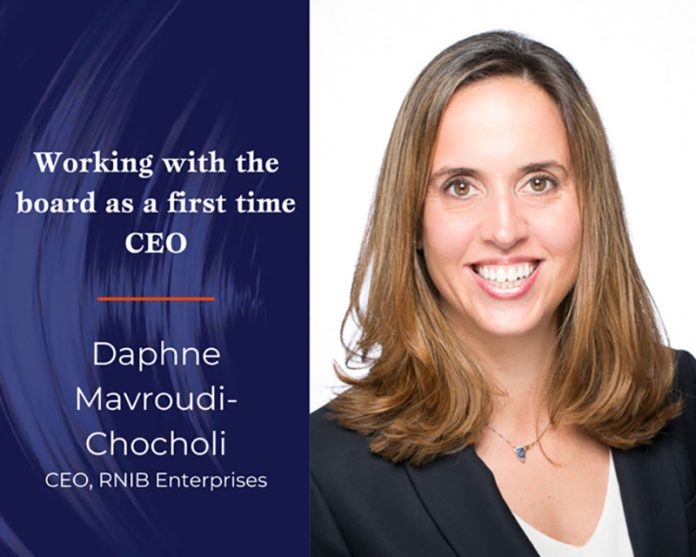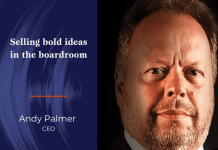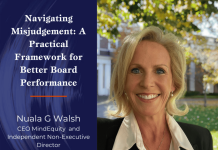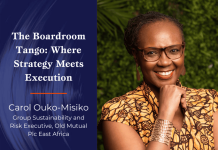The podcast and the article are brought to you by The Better Boards Podcast Series.
Boards can be complex structures, which can be overwhelming for a first-time CEO to navigate successfully. In this episode, we delve into the experiences of a first-time CEO. We discussed the challenges she encountered and the strategies she used to handle the intricacies of board dynamics.
In this episode, Dr Sabine Dembkowski, Founder and Managing Partner of Better Boards, speaks with Daphne Mavroudi-Chocholi about her experience working on a board for the first time.
Daphne, the Managing Director of RNIB Enterprises, brings a wealth of experience to the table. Her career spans over two decades, during which she has held senior-level positions in various industries. Her strategic, consultative approach and advocacy for innovation and inclusivity have been instrumental in her success. Her previous roles included managing director of Vetz Petz, head of organisational change at Barclays Bank, vice president of marketing effectiveness at Nielsen, and chief revenue officer at Machine Vantage.
“What has surprised me the most, coming from the start-up world, is the governance”
Daphne’s previous experience was in the start-up world. There is an established background in that world, and investors invest in the person and the idea. Now, she is the Managing Director of RNIB Enterprises, a for-profit subsidiary of a large charity in the UK, and charities in the UK are in a highly regulated environment. Comparatively, there are more risk registers, moving pieces, and compliance for her now than in the start-up world, impacting the board dynamics. She finds it constantly necessary to consider the right balance between governance, agility, nimbleness, and the ability to make decisions.
There has been a noticeable shift in board management philosophies and tactics over the years. The governance models that were effective in the 1980s and 90s may not be as relevant today. The business landscape has evolved, and the pace of change has accelerated. This raises the question: How can we maintain effective governance in a world that moves at this speed?
“There are two places I really see value coming through. One is honesty, and the other is the idea of working with a board rather than sitting on a board”
Daphne feels very lucky in her board relationships. She sees two areas where the board provides and creates particular value.
First, life as a CEO can be a lonely existence. You often have to edit conversations or refrain from sharing certain information with outsiders. With your board, on the other hand, there’s the opportunity for honest, no-holds-barred conversations, and that space for transparency creates immense value.
Secondly, by viewing the board as a partnership relationship, you gain the benefit of a critical friend. You are speaking with someone, or a group, who is close enough to the business to get the context but far enough removed from the day-to-day to offer a different and often clearer perspective. Daphne feels this is invaluable, and when her board comes together for formal meetings and decision-making, this is the backdrop for them.
“Ultimately, the truth will always be out, so there’s only so long that you can put on the dog and pony show to pretend that certain things are true, or that you’re a particular individual”
While Daphne enjoys a close partnership with her board, she realises that other CEOs may not have this kind of positive relationship. So, it is necessary to work at it and to create it. Daphne has a few ways that she goes about this.
One tactic is consciously switching roles. For example, at times, she will explicitly say to a board member, “Hats off, I’m no longer the Managing Director, and you’re not the chairperson or the director of the business. We’re having a person-to-person conversation for 10 minutes about the things that are challenging, and then we’re going to put our work hats back on.” So she has the conversation, and then, when the work hats go back on, a different conversation happens that is more fact-based, data-driven, and rational.
While some may find this role-switching challenging, she feels it can help build trust and transparency. Putting on a show doesn’t last, but authenticity and helping people understand you and where you’re coming from can lay the foundations for a supportive, collaborative relationship.
“The most challenging part of working with a board is striking that balance between managing the board, engaging with board members, ensuring alignment, and then actually doing the day-to-day job”
To Daphne, one can be pulled into board work and move away from the business. Or, one can go so deeply into the business that one forgets to update the board and bring them along on the journey. She finds it helpful to build an alliance with the Chairman of the Board to help manage stakeholders and information flow so a sense of balance can be created and maintained.
“What is the shining city on the hill we’re all marching toward?”
Along with an ally in the Chair, Daphne finds storytelling extremely helpful. She recommends a previous podcast with Joyti Gupta on storytelling for those interested. Storytelling helps create narrative fluency in the common culture and goals that drive the business. It can bring everyone together on the same page, build clarity on why things are being done, and drive everyone forward in the same direction.
“In God we trust; all others bring data”
A second thing immensely helpful to Daphne is an insistence on data. It builds credibility and helps move conversations from opinions and emotions to facts. This also helps build a strong foundation of fact-based decision-making in the board and company culture.
“The reality in working with a board is that when you share a 300-page document, often there’s gridlock”
Balance is a third element Daphne finds helpful to monitor closely. It links with the other factors. For example, if you have a straightforward narrative and sound data, you share what matters instead of everything. Companies often lack clarity, so they don’t know what to share and load their board packs with everything. This overwhelms boards and takes up incredible amounts of time. Daphne is a fan of the Amazon pack, which has a maximum of six pages, though she realises it’s aspirational for most! However, she feels a straightforward story allows for shorter packs and reduces the cognitive load on the board, boosting board effectiveness.
“You might as well be honest and transparent at the beginning.”
The final element for Daphne is transparency. She mentions it often because it matters on multiple levels. It builds trust. It helps us understand each other and the business. Above all, transparency helps extract maximum value from the board because when the members understand the story, data, and balance, they can understand how to bring their full range of skills and abilities forward, exponentially magnifying their impact.
“I would love to see boards really embrace diversity and bring different thinking into the room.”
Daphne would love to see boards expand their candidate pools beyond traditional work networks and the tried-and-tested executive firms. She would love to see more individuals with diverse backgrounds and broader characteristics, be it gender, age, or ability. It might appear at first as extra work, but she feels it allows everyone to expand, amplify, and augment their thinking, meaning real value can be extracted with some work upfront.
The three top takeaways from our conversation are:
- It is imperative to create narrative fluency with your board. Clearly describe the proverbial “Shining City on a Hill” as the whole organisation and the Board marching toward it.
- Build diversity around the Board table, especially diversity of thought and working style, to challenge the status quo in a good way.
- Truth will come out – it is best to be honest and transparent from the start.
Don’t forget to subscribe never to miss an episode of the Better Boards Podcast Series. Available on their website, Apple, Spotify or Google.
To find out how you can participate in the Better Boards Podcast Series or more information on Better Boards’ solutions, please email us at info@better-boards.com.





































